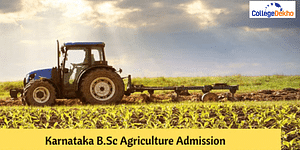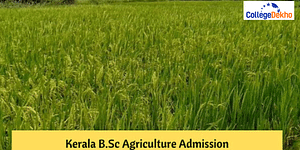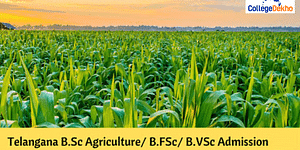Agricultural Engineering Syllabus & Subjects
Agriculture Engineering Syllabus Overview
Agriculture Engineering is a 4-year course that is offered to undergraduate, postgraduate, and PhD students. Students interested in doing Agriculture Engineering have two options 1 to complete the program in 4 years and another option is doing a diploma which is for 3 years. Students who want to opt for higher education can enroll themselves in a course of M.Tech in agricultural engineering or in a PG Diploma course. Interested students can also do a Ph.D. in Agricultural Engineering.
The course provides students with the knowledge and skills they need to design, develop, and manage agricultural systems. Agricultural Engineering is a multidisciplinary field that combines engineering principles with agricultural sciences to address the evolving challenges of modern agriculture. The syllabus typically covers subjects such as farm machinery and equipment design, irrigation systems, soil and water conservation, crop production techniques, and agricultural automation. Students learn about sustainable farming practices, precision agriculture, and agribusiness management.
Table of Contents
- Agriculture Engineering Syllabus Overview
- Agricultural Engineering Highlights
- Agricultural Engineering Semester Wise Syllabus
- Agriculture Engineering Syllabus for Distant Education
- Agricultural Engineering Subjects
- Specialization Subjects Offered in Agricultural Engineering
- Agricultural Engineering Course Structure
- Agricultural Engineering Important Books
- FAQs about Agricultural Engineering Syllabus
Agricultural Engineering Highlights
Agricultural Engineering is a branch of engineering that applies engineering principles and technology to solve problems in agriculture. Agricultural engineers work to improve the efficiency, productivity, and sustainability of agricultural production. Below listed are some main highlights of Agricultural Engineering.
- Agricultural engineers play a vital role in feeding the world's growing population. They develop and implement technologies that help farmers produce more food with fewer resources, and also protect the environment during the process of production.
- Agricultural engineers can work in a wide range of industries, including agriculture, food processing, environmental engineering, and renewable energy. They may also work for government agencies, research institutions, or non-profit organizations.
- Agricultural engineering courses typically include a significant amount of hands-on learning. Students have the opportunity to work in labs, design and build agricultural equipment, and conduct field research.
- Agricultural engineering is a multidisciplinary field that draws on knowledge from engineering, science, and agriculture. This allows agricultural engineers to develop innovative solutions to complex problems.
Agricultural Engineering Semester Wise Syllabus
The course of Agricultural Engineering covers a wide of subjects that include farm machinery, livestock an poultry production, agricultural processes in industries, and more. Mentioned are the subjects which are included in the Agricultural Engineering syllabus
B. Tech Agricultural Engineering Syllabus
Candidates can check the semester wise Agricultural Engineering Syllabus at the BTech level.
First Year Agricultural Engineering Syllabus- BTech Level
The semester wise Agricultural Engineering Syllabus at the BTech level for the first year has been presented in the table below.
| Semester 1 | Semester 2 |
|---|---|
| Engineering Physics | Engineering Chemistry |
| Mathematics - I | Mathematics - II |
| Engineering Physics Lab | Basic Electrical Engineering / Basic Electronics Engineering |
| EG Lab | Computer Programming |
| Engineering Graphics | Programming Lab |
| Basic Electronics | Engineering Mechanics |
| Environmental Studies | Engineering Mechanics Lab |
Second Year Agricultural Engineering Syllabus- BTech Level
The semester 3 and semester 4 Agricultural Engineering Syllabus at the BTech Level has been listed in the table below.
| Semester 3 | Semester 4 |
|---|---|
| Soil Mechanics | Soil and Water Conservation Engineering |
| Farm Machinery and Equipment-I | Farm Machinery and Equipment II |
| Engineering Properties of Biological Materials and Food Quality | Horticulture Crop Management |
| Fluid Mechanics | Irrigation Engineering |
| Engineering Mathematics III | Tractor System and Control |
| Farm Power | Heat and Mass Transfer |
| Statistical Methods | Engineering Hydrology |
Third Year Agricultural Engineering Syllabus- BTech Level
The semester wise Agricultural Engineering Syllabus at the BTech level for the third year has been presented in the table below.
| Semester 5 | Semester 6 |
|---|---|
| Machine Design | Drying and Storage Engineering |
| Tractor and Automobile Engines | Remote Sensing and GIS |
| Soil Conservation Structures Design | Watershed Planning and Management |
| Electrical Machines and Power Utilization | Groundwater, Wells and Pumps |
| Agroecology and Food Sustainability | Renewable Power Sources |
| Agricultural Structures & Environmental Control | Field Operation and Maintenance of Tractor and Farm Machinery |
| Drainage Engineering | Refrigeration and Air Conditioning |
Fourth Year Agricultural Engineering Syllabus- BTech Level
Candidates can check the semester wise Agricultural Engineering Syllabus at the BTech level from the following table.
| Semester 7 | Semester 8 |
|---|---|
| System Engineering (Operation Research) | Minor Irrigation and Command Area Development |
| Farm Business Management and Village Industries | Agricultural Extension |
| Food Packaging Technology | Food Process Plant Design & Layout |
| Human Safety & Engineering (Elective) | Operation, Maintenance and economic evaluation of water Resource Projects (Elective) |
| Mainstream Agricultural Engineering (Elective) | Agritech and Entrepreneurship Specialisation (Elective) |
| Dairy Engineering Specialisation (Elective) | Food Law & Legislation (Elective) |
| Seminar | Internship |
Diploma in Agricultural Engineering Syllabus
The semester-wise Agricultural Engineering Syllabus at the diploma level has been listed in the table below.
First Year Agricultural Engineering Syllabus - Diploma Level
The semester-wise Agricultural Engineering Syllabus at the Diploma level for the first year has been presented in the table below.
| Semester 1 | Semester 2 |
|---|---|
| Introduction to Agriculture | Crop Production |
| Principles of Agronomy | Soil Chemistry |
| Fundamentals of Soil Science | Principles of Insect Control |
| Fundamentals of Entomology | Plant Pathology |
| Economic Botany | Agricultural Meteorology |
| Principles of Horticulture | Livestock and Poultry Production |
| Biomathematics | Basics of Agricultural Engineering |
Second Year Agricultural Engineering Syllabus - Diploma Level
The semester-wise Agricultural Engineering Syllabus at the Diploma level for the Second year has been presented in the table below.
| Semester 3 | Semester 4 |
|---|---|
| Principles of Genetics | Plant Breeding |
| Water Management | Agricultural Statistics |
| Pests and Pest Control | Weed Management |
| Diseases of Field Crop | Green House Technology |
| Production of Technology of Food Crops | Agricultural Microbiology |
| Dairy Cattle and Buffalo | Seed production technology |
| Organic Farming and Sustainable Agriculture | Post-Harvest Technology |
| Plant Nutrition, Manures, and Fertilizers | - |
Agriculture Engineering Syllabus for Distant Education
| Semester-1 | Semester-2 |
|---|---|
| Principles of Soil Science | Communication Skills & Personality Development |
| NSS (Non-gradial) | Strength of Materials |
| Engineering Chemistry | Workshop Technology and Practices |
| Engineering Mechanics | Environmental Science and Disaster Management |
| Engineering Drawing | Engineering Mathematics-II |
| Surveying and Levelling | Theory of Structures |
| Engineering Mathematics | Principles of Agronomy |
| Engineering Physics | Elect. Machines and Power Utilisation |
| Heat and Mass Transfer |
| Semester-3 | Semester-4 |
|---|---|
| Engineering Mathematics-III | Engineering Properties of Agricultural Produce |
| Entrepreneurship Development and Business Management | In-plant training-I |
| Fluid Mechanics and Open Channel Hydraulics | Machine Design |
| Theory of Machines | Irrigation Engineering |
| Soil Mechanics | Farm Machinery & Equipment-I |
| Thermodynamics, Refrigeration and Air Conditioning | Building Construction and Cost Estimation |
| Web Designing & Internet Appl. | Tractor and Automotive Engines |
| Principles of Horticultural Crops and Plant Protection | Fundamentals of Renewable Energy Sources |
| Applied Electronics & Instrumentation | Watershed Hydrology |
| - | Auto CAD Applications |
| Semester-5 | Semester-6 |
|---|---|
| Drainage Engineering | In-plant training-II |
| Sprinkler and Micro Irrigation system. | Groundwater, Wells and Pumps |
| Educational Tour during winter | Bio-energy Systems: Design and Applications |
| Farm Machinery and Equipment II | Post Harvest Engineering of Horticultural Crops |
| Renewable Power Sources | Tractor Systems and Controls |
| Agricultural Structures and Environmental Control | Tractor and Farm Machinery Operation and Maintenance |
| Soil and Water Conservation Engineering | Computer Programming and Data Structures |
| Post Harvest Engg. of Cereals, Pulses and Oil Seeds | Dairy and Food Engineering |
| Watershed Planning and Management | Water Harvesting and Soil Conservation Structures |
Agricultural Engineering Subjects
The Agricultural engineering subjects include Farm Machinery and Equipment, Engineering Hydrology, Watershed Hydrology, Crop Process Engineering, and much more. The course is further divided into core, elective, and help subjects that help students to get complete knowledge and understanding about the subject /topics.
Agricultural Engineering Core Subjects
The syllabus of Agricultural Engineering includes core subjects that play a crucial role in developing the base of the course. Core subjects help students to get basic knowledge about the course. Below listed are some core subjects of Agricultural Engineering
- Soil Mechanics
- Farm Machinery and Equipment
- Principles of Agronomy
- Engineering Mathematics
- Engineering Properties of Biological Materials and Food Quality
- Watershed Hydrology
- Crop Process Engineering
- Electrical Machines and Power Utilization
- Tractor Systems and Controls
- Tractor and Automobile Engineering
- Agril. Structures and Environmental Control
- Agricultural Structures & Environmental Control
Agricultural Engineering Elective Subjects
During the program, students get the chance to choose electives based on their area of ??interest or their field of career which allows students to gain deeper or more detailed knowledge about the subject they choose. Below are the electives offered to students.
- Soil and Water Engineering
- Farm Machinery and Power Engineering
- Agricultural Process & Food
- Mainstream Agricultural Engineering
- Dairy Engineering Specialisation
- Agritech & Entrepreneurship Specialisation
- Irrigation and Drainage Engineering
- Agricultural Process Engineering
- Farm Structure
Specialization Subjects Offered in Agricultural Engineering
Agricultural Engineering Specializations allow a student to gain a better understanding and knowledge in the field of Agriculture. The subjects offered are listed below
- Agricultural Economics
- Agricultural Machinery Design
- Agricultural Waste Management
- Crop Production
- Dairy Management
- Food Engineering
- Irrigation and Drainage Systems
- Process Control
- Post-Harvest Technology
- Poultry and Fish Processing
- Soil and Water Engineering
Agricultural Engineering Course Structure
The Agricultural Engineering course is divided into 8 semesters. The structure of Agricultural Engineering courses includes the design, manufacturing, and development of agricultural tools and machinery. Listed below are the important books that can be referenced in the B.Tech Agricultural Engineering syllabus:
- VIII Semesters
- Core and Elective subjects
- Internship
- Project Submission
Agricultural Engineering Important Books
While studying, students refer to books to help them learn more and improve their knowledge and understanding of a particular topic or subject. Mentioned is the list of popular books recommended for students pursuing Agricultural Engineering.
- Soil Enzymology by Ajit Varma and Girish Shukla
- Pulses and Vegetables by Jack Dongarra
- Coastally Restricted Forests by Aimlee D Laderman
- High-Tech and Micropropagation Volume: 5 by YPS Bajaj
- Machine Design by Dr. Sadhu Singh
FAQs about Agricultural Engineering Syllabus
For how long is the course of Agricultural Engineering?
The course of Agricultural Engineering is for 4 years.
Which are the entrance examinations held for this course?
The Agricultural Engineering entrance examination includes national, state, and college/university-level examinations such as ICAR AIEEA, KCET, EAMCET and more
What is the average placement package for B.Com Taxation?
The average placement package is around INR 2.5 LPA.
What is the average course fee for Agricultural Engineering program?
The average course fee of agricultural engineering is around INR 1 - 5 LPA.
Which are the best colleges for Agricultural Engineering?
Sardar Vallalbhbhai Patel University of Agriculture and Technology, College of Agriculture Bangalore, Hindustan College of Engineering and Technology Coimbatore, Bannari Amman Institute of Technology Erode, Maharashtra Institute of Technology Aurangabad and KIT College of Engineering Kolhapur are some of the best colleges that offer the course of Agricultural Engineering.
Popular Courses
- Courses
- Agricultural Engineering
- Syllabus


















